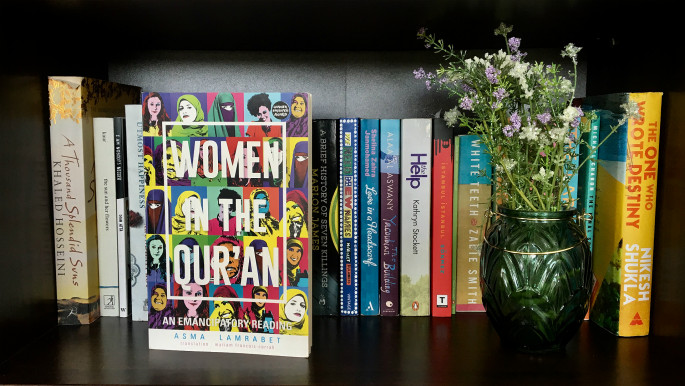This Green and Pleasant Land: Exploring racism, prejudice and the nature of assimilation
The opening scene of Ayisha Malik's third novel, This Green and Pleasant Land, is a perfect combination of sad, funny, witty and poignant, and sets the tone for the rest of the book as, overcome by grief and a little bit of guilt in the months following his mother's death, Bilal decides to make her dying wish a reality.
Malik's previous two novels – Sofia Khan is Not Obliged and its sequel The Other Half of Happiness – established her as a fresh voice in rom com writing. Her homage to and twist on Bridget Jones gave us a Muslim protagonist for the modern age, one who was desiring of and desired love, and one who seamlessly moved between cultures without ever losing sight of herself.
This Green and Pleasant Land retains the humour and great characterisations of Malik's previous novels (including the books she wrote with Great British Bake Off winner Nadiya Hussain), but it clearly also shows her maturation as a writer and is easily her best work to date.
Part of that is down to, as previously mentioned, the characterisation that Malik is so good at. Our focus is on Bilal (known as Bill to fellow villagers), a man who has comfortably carved out a space for himself in Babbel's End, along with his wife Miriam and Miriam's young son from a previous marriage.
But Malik's genius is in creating a fully rounded cast of characters around her protagonist, all of whom have distinct lives and points of view. It is these characters – from busybody Shelley Hawing to the village's vicar Richard and the aunties from Birmingham who make brief but impactful appearances – that make This Green and Pleasant Land such a joy to read.
 |
With subtlety, Malik explores racism, prejudice and the nature of assimilation, and that's what makes this novel so brilliant |  |
Looming above them all is my favourite character, Bilal's aunt Rukhsana, or Khala as she is called by everyone. Khala's character arc is the best of the novel. Having married young, and then lost her husband shortly after the wedding, Khala lived most of her life with her sister in Birmingham, barely leaving the confines of the close-knit Asian community, and never needing to learn English or step outside her comfort zone.
 |
|
| Read more from The New Arab's Book Club: Women in the Qur'an: 'Reappropriating' Muslim women's destinies |
But in Babbel's End, she begins to find out who she really is, and in doing so impacts the lives of others in meaningful ways. Khala is, it is no exaggeration to say, the heart and soul of This Green and Pleasant Land.
This Green and Pleasant Land can be read solely as a village comedy about a set of quirky characters, but to do so would be an injustice to Malik's writing. With subtlety, Malik explores racism, prejudice and the nature of assimilation, and that's what makes this novel so brilliant.
Bilal has assimilated so well into Babbel's End that the villagers see him as one of their own, something that could be viewed as a great success. But this assimilation has been detrimental to both Bilal, who has lost a part of himself, and to the village, which seems to think it's living in some kind of post-racial utopia all because it has one (mostly culturally) Muslim family that it considers a part of the community.
Of course, that's all shattered when Bilal announces his plans to build a mosque in Babbel's End, and it's at this point that everything begins to fall apart.
Malik shows how easily bonds are broken when fear of the "other" is brought into the equation, how delicate the balance is between what is an acceptable kind of difference and what is not, and how pervasive racism is in British society.
The kind of racism and prejudice on show in This Green and Pleasant Land is largely of the low-key but pernicious sort that many Muslims and people of colour will relate to – snide or abusive comments, side glances, cold shoulders for no reason.
 |
Malik shows how easily bonds are broken when fear of the 'other' is brought into the equation, how delicate the balance is between what is an acceptable kind of difference and what is not, and how pervasive racism is in British society |  |
In exploring how this kind of racism and prejudice operates, Malik also astutely captures how it is often combatted: not through a breaking down of barriers and compassion and understanding by those who perpetrate the hatred, but either by the victims choosing to brush off or underplay the effects of any abuse, or by racists and the prejudiced being threatened by something bigger.
It's this insight into human nature that makes This Green and Pleasant Land a novel I want to press into the hands of everyone I meet. Astute, knowing and full of humanity, this deserves to be Malik's breakout novel.
Sarah Shaffi is a freelance literary journalist and editor. She writes about books for Stylist Magazine online and is books editor at Phoenix Magazine. She is a judge for the Jhalak Prize 2019. Sarah is editor-at-large at independent children's publisher Little Tiger Group. She regularly chairs author events, and is co-founder of BAME in Publishing, a networking group for people of colour in publishing.
Follow her on Twitter: @sarahshaffi




